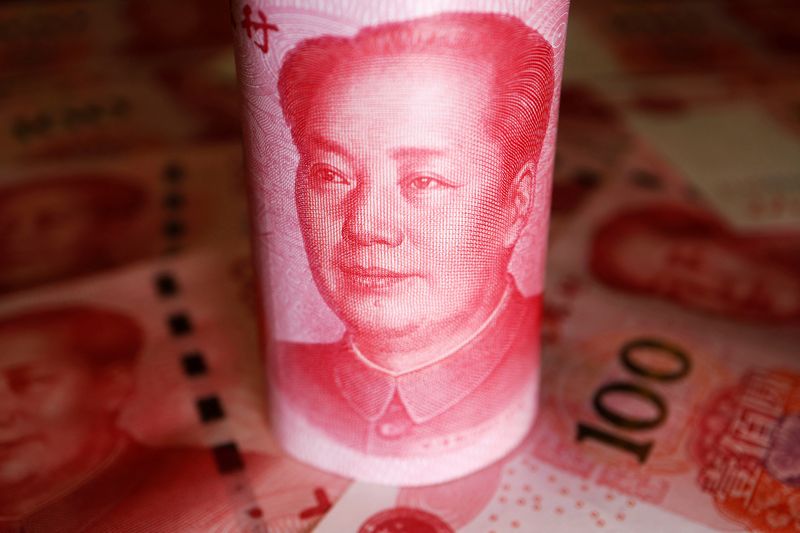By Samuel Shen and Summer Zhen
SHANGHAI/HONG KONG (Reuters) - China's computer-driven "quant" hedge funds are beefing up risk management and retooling their portfolios to conform to the state's definitions of fair play, as regulators clamp down on the $260 billion sector to revive retail investor confidence.
Hedge fund Leon Capital said it will monitor liquidity risks more closely, JoinQuant has reduced its exposure to small-capital stocks, Lingjun Investment has committed to a "bullish stance" on Chinese equities and Siyuan Quant said it would invest in hi-tech companies to "service national strategy".
The crackdown on funds using statistical models and computer algorithms to make trading decisions follows a February market crash dubbed China's "quant quake", reminiscent of a machine-driven 2007 Wall Street selloff that preceded the global financial crisis.
China's stock market plunge to five-year lows showed how statistical quant trading models can lead to market herding and stampedes. Retail investors, who account for more than 70% of trading, railed at programme traders and "flash boys" who flip shares in nanoseconds for quick profits.
Funds are now girding for the reshaping of a sector that has thrived by exploiting China's market inefficiencies and volatility, as regulators prepare to publish further curbs, according to people familiar with regulators' thinking.
Regulators are walking a tightrope between efficiency and fairness, as China's increasingly deregulated market has already lured global quant giants including Man Group, Two Sigma and Winton.
Wu Qing, the new head of the China Securities Regulatory Commission (CSRC), has zeroed in on quant funds, an industry that had doubled in three years despite punishing losses in the broader market.
"We must pay high attention to fairness... especially in a market dominated by small investors," Wu told a press conference on March 6, vowing to enhance regulation of quantitative investment.
In his first month at the helm, the CSRC has restricted short-selling, suspended Lingjun accounts for disrupting market order and punished another quant fund for high-frequency trading.
"Frequency, leverage, short-selling - these three words have become sort of taboo" in public discussions for hedge funds, said Alfred Zhu, marketing director of Cedar Capital, a Shanghai-based quant fund manager.
'TRAINING AND ADMONISHMENT'
Following its punishment by the regulators, Lingjun said it was "deeply sorry" for the negative impact of its trading, committed itself to a long-term "optimistic view" on China stocks and vowed to "improve trading models, rigorously control trading progress and constraints and ensure a smooth and balanced trading process".
Leon Capital will beef up monitoring of market signals such as liquidity, volatility and stock index-futures spreads, said the firm's general manager, Ji Yanhong. "If you sense market dangers early, you don't panic."
Siyuan Quant founder Wang Xiong said China's quant quake was caused by computer models guiding too much money into rising small-cap stocks, so that "when the boat capsized, everyone was found standing on the same side".
"We need to pay more attention to company fundamentals" in constructing models, rather than just price and volume. We will use advanced technology to invest in hi-tech companies to service national strategy and the real economy."
China's 28 leading quant fund companies were summoned to Shenzhen on Feb. 29 for compliance training by the exchange, said two people with direct knowledge of the event.
All the big players went, "as compliance is a priority now, given Lingjun had just been penalised," one of the sources said. "It was a good opportunity to communicate directly with regulators."
At the session, organised by the Shenzhen and Shanghai exchanges, regulators urged participants to strengthen risk control, warning against misbehaviour such as spoofing and "pump and dump" tactics, the source said. "It was both training and admonishment."
The CSRC and the exchanges, which enforce much of the regulator's policies, did not reply to Reuters requests for comment.
'TUSSLE' OVER PROGRAMME CODES
China's private quant fund industry sprang up in 2010, when the country launched its first stock index futures, providing an essential shorting tool for hedge funds seeking to profit from price falls. Since then, the market has attracted Wall street traders and data scientists in search of "alpha", or outperformance.
Quant fund giant Yanfu Investments told investors at a roadshow on Feb. 27 that it is not engaged in high-frequency trading and does not "trade intensively near market open and close".
"Regulators hope trades don't impact markets, and we're moving toward this direction," said Vice President Huang Si Mindi.
In addition, the watchdog has been asking quant funds to hand in programme codes for closer scrutiny, said a person who has been in touch with regulators.
"There has been a tussle over this," the person said. "Hedge funds see codes as business secrets. Regulators argue it would be safe in the hands of government."
The Beijing Fund Town Research Institute says quant algorithms can be "partially" transparent. "Being totally transparent is too costly and not realistic," it said in a white paper.
Jack Schwager, head of research at FundSeeder Technologies, said Chinese restrictions on short-selling of stocks - an essential tool for hedge funds - do not help the market.
"There is nothing inherently wrong in short selling," said the author of "Market Wizards". "Stocks go down because of negative or deteriorating fundamentals... Critics of short selling are basically scapegoating."
